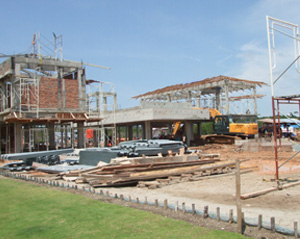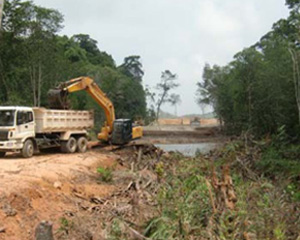

Work is now under way on Lagoi Bay, a resort community encompassing over 1300 hectares on Bintan Island, one of Indonesia’s largest islands. Valued at approximately $812 million, the project is slated to be completed by 2014.
Once a coconut plantation, the coastal development is less than an hour away by ferry from Singapore. The owners, Bintan Resorts, hope to tap into the tourism traffic to Singapore, which draws more than 9 million business and leisure travelers each year.
Lagoi Bay’s master plan was conceived by Australian-based Burchill VDM with Singapore-based Meinhardt Engineering. The contractors are PT Total Bangun Persada, with PT Airmas Asri of Indonesia and DP Architect of Singapore providing architectural services.
The plan includes a 20-ha village center with 135 small plots ranging from 35 sq meters to 5,000 sq m. Outside the center, the scheme features larger sites ranging from 60 sq m to 30 ha, along with a golf course and marina. This is the first time in Bintan that small parcels have been offered for sale to private investors.
The developers also aim to build an airport with a 2.3-km runway. On June 2, “an airport for narrow- and wide-bodied aircraft was approved, with construction to be completed within three years,” says Asad Shiraz, marketing director for Bintan Resorts. The airport project is being handled by Bintan Resorts’ parent company, Gallant Venture. “We will build this airport, but we are open to partners from outside our company,” says Shiraz.
A 2-km long lake, with a 53-ha surface area, also is under construction at Lagoi Bay. It will be filled with groundwater and rainwater run-off, says engineer Richard Chin, director of resort planning for Bintan Resorts. The lake is “basically an uninhabited natural catchment,” Chin says, adding that it also will “enhance the land value as well as provide a nice water feature for the development.”
The entire Lagoi Bay project faces many engineering challenges, particularly because a significant section of its main road passes through peat forests. Soil replacement to improve the ground condition for proper drainage has proved difficult, according to Chin. Moreover, since most of the land is freshwater swamp, the water table has to be maintained at a correct level to ensure that vegetation is not killed.
“Future challenges will be mainly in the area of environmental controls and maintaining good water quality at the lake, as well as at sewage treatment plants outlets,” says Chin. He adds that the project’s drainage systems also have to include gross pollutant traps in order to minimize the pollutants entering the lake and the South China Sea.
Lagoi Bay is one of several Bintan Resorts developments in the northern part of the 2,400-sq-km Bintan Island. Launched in 1990 as a collaborative initiative between the governments of Singapore and Indonesia, the Bintan Resorts area was designated a free trade zone in 2009, and special tax concessions are offered to encourage investments. It has also been declared a “protected zone,” in which strikes and riots are not allowed.


Post a comment to this article
Report Abusive Comment